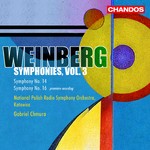
Symphonies Nos 14 and 16
 $40.00
Out of Stock
$40.00
Out of Stock6+ weeks add to cart
MIECZYSLAW WEINBERG
Symphonies Nos 14 and 16
National Polish Radio Symphony Orchestra, Katowice / Gabriel Chmura (cond)
[ Chandos / CD ]
Release Date: Sunday 22 October 2006
This item is currently out of stock. It may take 6 or more weeks to obtain from when you place your order as this is a specialist product.
'This third volume of Gabriel Chmura's Weinberg cycle features two single-movement symphonies from the years of after Shostakovich's death. Each one is out of the top drawer… Here [in the Fourteenth] and in the Sixteenth, the Polish orchestra do their conductor, themselves and Weinberg proud. An issue of considerable accomplishment and importance.'
Gramophone.
'This third volume of Gabriel Chmura's Weinberg cycle features two single-movement symphonies from the years of after Shostakovich's death. Each one is out of the top drawer… Here [in the Fourteenth] and in the Sixteenth, the Polish orchestra do their conductor, themselves and Weinberg proud. An issue of considerable accomplishment and importance.'
Gramophone
The National Polish Radio Symphony Orchestra, Katowice is Poland's leading orchestra and has premiered works by some of the twentieth century's most significant composers.
Weinberg was one of the most prolific and inventive creative musical figures of the twentieth century. The reason for the neglect of his music is largely political, for Weinberg, as a bourgeois Jew, suffered under both Nazism and Soviet Communism. It is only since the barriers between the Soviet Union and the West were lowered that scholars worldwide have come to realise the importance of Weinberg's legacy.
The music of Mieczyslaw Weinberg is full of colour and rhythmic energy (Shostakovich was his most important influence and described Weinberg as 'one of the most outstanding composers of the present day'), often slightly quirky in nature, and always inventive. Besides Shostakovich, other palpable influences on Weinberg's music were Prokofiev, Stravinsky and especially Mahler. More of a romantic than his mentor, Weinberg composed music which is notable for the lyrical beauty of its melodies and its extraordinarily fine thematic development. Its neglect is due in large part to the circumstances of the composer's life, rather than to its intrinsic quality, and it is therefore well suited to receiving the full Chandos treatment, which will bring it to the wider audience it deserves.
Reviews:
'Gabriel Chmura and the Polish National Radio Orchestra revel in the Rhapsody's many opportunities for virtuosity, and they deliver vibrant and committed accounts of the Symphony and Sinfonietta. Add to this equation Chandos's customary state-of-the-art engineering, and you have a release that deserves the widest possible dissemination.'
BBC Music Magazine on Volume Two CHAN 10237
Tracks:
Symphony No. 16, Op. 131 (1981)
Symphony No. 14, Op. 117 (1977)